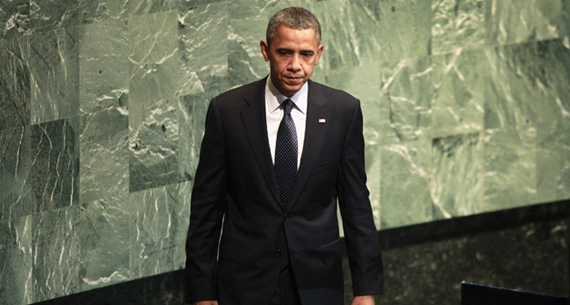It was expected that one of the main issues to be addressed at the United Nations General Assembly session of 2012 would be Syria. When U.S. President Barack Obama addressed, for the majority of his speech, the provocations caused by the motion picture insulting Islam released in recent weeks, the Muslim world was set as the focal point of this year’s assembly. Obama’s speech contained rhetorically satisfying sentences on both issues. However, he did not give any indication of a tangible next move. Obama’s lack of commitment to a tangible solution undermines the seriousness of both issues. Islamophobia and the Syrian issue have long exceeded being simply regional or global problems. They have turned into serious tests.
In terms of the Syrian crisis, Obama’s speech was trapped between rhetoric and tangible plans. This position, which acknowledges the Syrian peoples’ pain but stops short of taking any tangible action, is generally understood to be due to the upcoming presidential elections in the U.S. This analytical approach is not at all convincing. Certainly, the 2012 elections have played some role in the U.S. stance on the Syrian crisis, however American foreign policy on Syria is not determined solely by the upcoming elections. The most considerable effect of the upcoming elections on the Syrian crisis is its function of legitimizing the lack of action on America’s part, but the U.S. policy on Syria would not have changed even if there were no presidential elections this year.
The U.S. is forced to display the same hesitation and lack of tangible policy on many issues in the Middle East for as long as it maintains its distorted relationship with Israel. A weakened al-Assad, heightened regional tensions, and increased regional rivalry have now been realized. However, those who believe these negative trends will be the main influence shaping the future of the Middle East do not really understand the ongoing transformation in the region. It can be claimed that the current negative geopolitical climate is completely conjectural, because neither the peoples nor the new incumbent political actors share a similar wave of tensions.
Obama’s only geopolitically tangible sentence about the Syrian crisis was his criticism of “Iran’s support of the Syrian Baathist regime.” In fact, this reaction is accurate but incomplete. As far as we know, what has prevented Obama and the international community from taking tangible steps in the Syrian crisis has not been Iran. Iran is an indicator of a wider problem in the region that is in the throes of the Syrian crisis. In fact, if we are going to talk about Iran, is it possible to simply ignore Iraq or the al-Maliki administration? Before Iran, Obama should have questioned the support Russia andChina afforded to the massacres in Syria by using their veto power. Had Obama done that we could have said “The U.S. has taken a different position to Israel in the Syrian crisis”. In fact, we could even claim that the U.S. had a foreign policy on Syria.
The only way the U.S. can take a constructive role in the Middle East in the aftermath of the Arab uprisings is to follow a foreign policy that is realistic and geared towards restoring justice. This, in turn, depends on the U.S. developing and executing an actual “foreign policy on Israel.” Seeing that the U.S. cannot determine its own foreign policy on Israel without Israel’s input, even at a time when the U.S. president can



